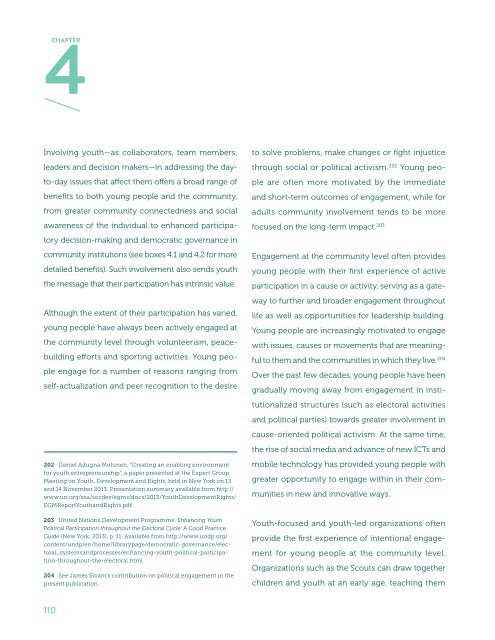YOUTH CIVIC
JieguI2U
JieguI2U
You also want an ePaper? Increase the reach of your titles
YUMPU automatically turns print PDFs into web optimized ePapers that Google loves.
4CHAPTER<br />
Involving youth—as collaborators, team members,<br />
leaders and decision makers—in addressing the dayto-day<br />
issues that affect them offers a broad range of<br />
benefits to both young people and the community,<br />
from greater community connectedness and social<br />
awareness of the individual to enhanced participatory<br />
decision-making and democratic governance in<br />
community institutions (see boxes 4.1 and 4.2 for more<br />
detailed benefits). Such involvement also sends youth<br />
the message that their participation has intrinsic value.<br />
Although the extent of their participation has varied,<br />
young people have always been actively engaged at<br />
the community level through volunteerism, peacebuilding<br />
efforts and sporting activities. Young people<br />
engage for a number of reasons ranging from<br />
self-actualization and peer recognition to the desire<br />
202 Daniel Adugna Muluneh, “Creating an enabling environment<br />
for youth entrepreneurship”, a paper presented at the Expert Group<br />
Meeting on Youth, Development and Rights, held in New York on 13<br />
and 14 November 2013. Presentation summary available from http://<br />
www.un.org/esa/socdev/egms/docs/2013/YouthDevelopmentRights/<br />
EGMReportYouthandRights.pdf.<br />
203 United Nations Development Programme, Enhancing Youth<br />
Political Participation throughout the Electoral Cycle: A Good Practice<br />
Guide (New York, 2013), p. 11. Available from http://www.undp.org/<br />
content/undp/en/home/librarypage/democratic-governance/electoral_systemsandprocesses/enhancing-youth-political-participation-throughout-the-electoral.html.<br />
204 See James Sloam’s contribution on political engagement in the<br />
present publication.<br />
to solve problems, make changes or fight injustice<br />
through social or political activism. 202 Young people<br />
are often more motivated by the immediate<br />
and short-term outcomes of engagement, while for<br />
adults community involvement tends to be more<br />
focused on the long-term impact. 203<br />
Engagement at the community level often provides<br />
young people with their first experience of active<br />
participation in a cause or activity, serving as a gateway<br />
to further and broader engagement throughout<br />
life as well as opportunities for leadership building.<br />
Young people are increasingly motivated to engage<br />
with issues, causes or movements that are meaningful<br />
to them and the communities in which they live. 204<br />
Over the past few decades, young people have been<br />
gradually moving away from engagement in institutionalized<br />
structures (such as electoral activities<br />
and political parties) towards greater involvement in<br />
cause-oriented political activism. At the same time,<br />
the rise of social media and advance of new ICTs and<br />
mobile technology has provided young people with<br />
greater opportunity to engage within in their communities<br />
in new and innovative ways.<br />
Youth-focused and youth-led organizations often<br />
provide the first experience of intentional engagement<br />
for young people at the community level.<br />
Organizations such as the Scouts can draw together<br />
children and youth at an early age, teaching them<br />
110


